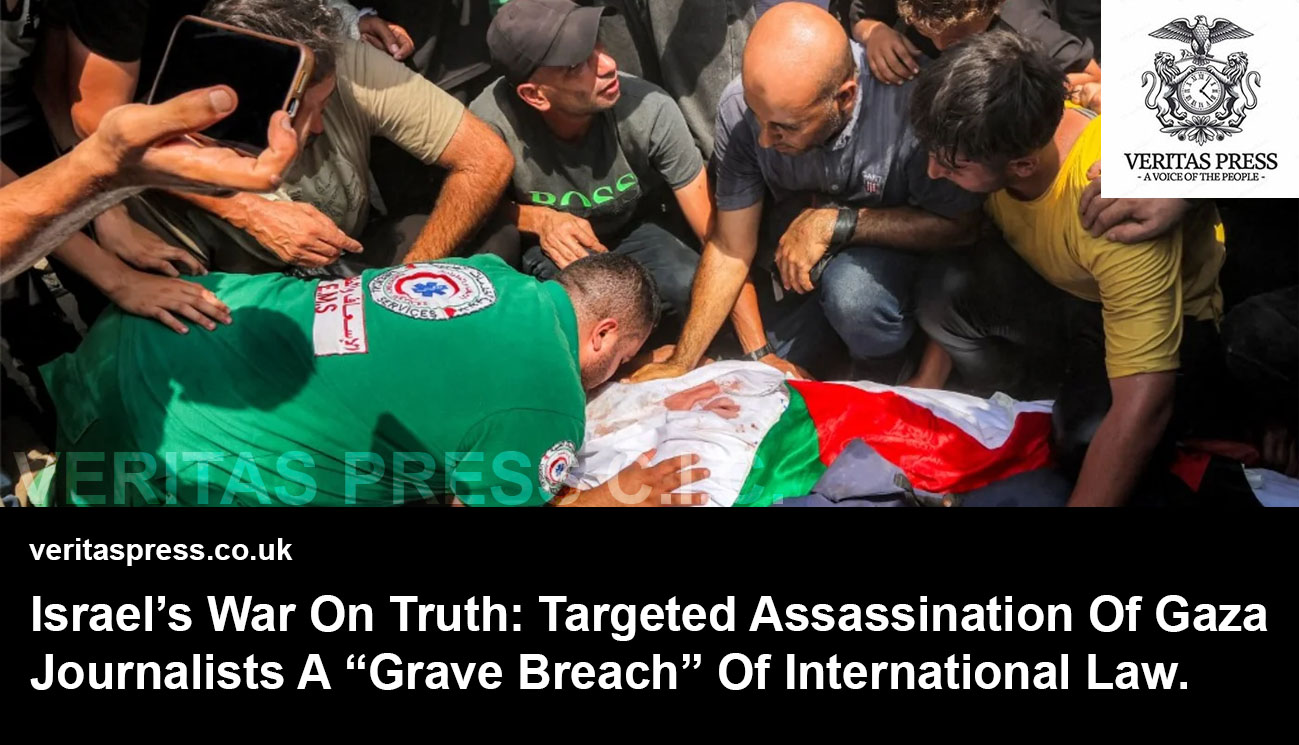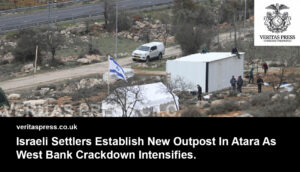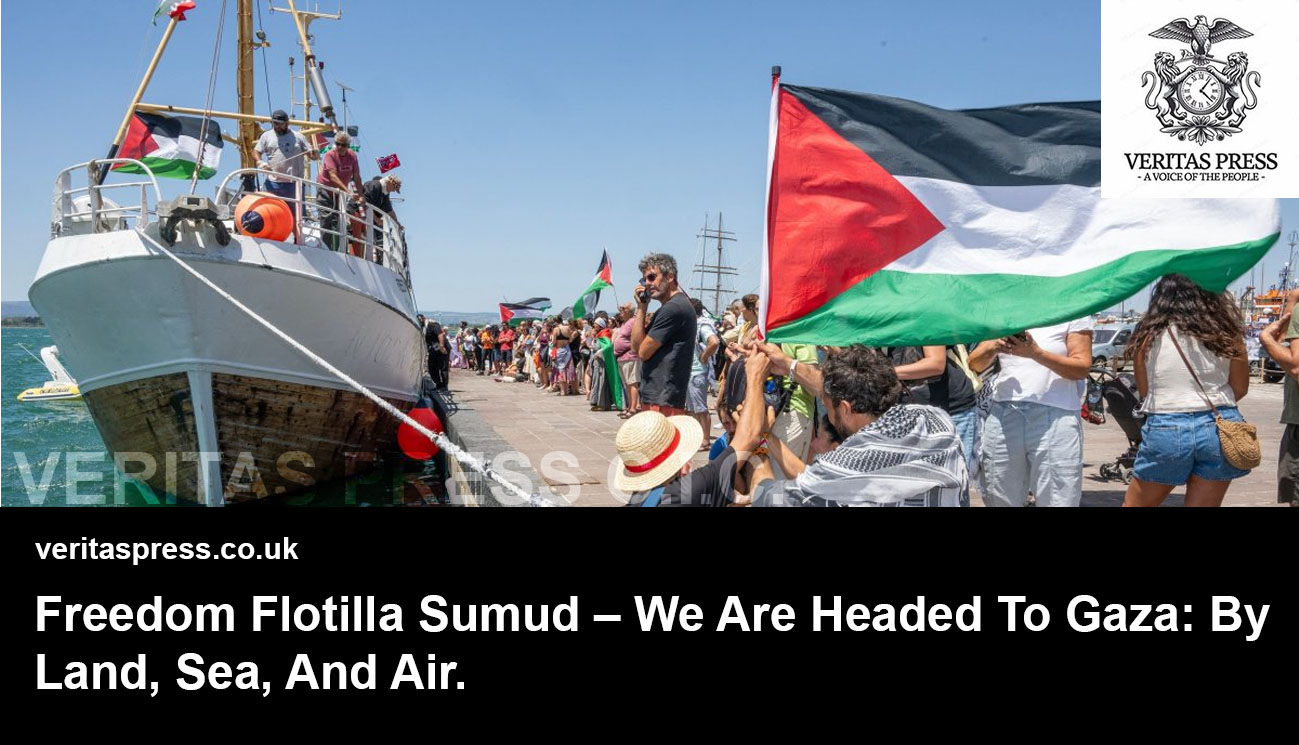Press Release: Veritas Press C.I.C.
Author: Kamran Faqir
Article Date Published: 11 Aug 2025 at 18:43 GMT
Category: Middle East | Palestine-Gaza | US-Israel At War
Source(s): Veritas Press C.I.C. | Multi News Agencies
At least 238 journalists killed amid relentless siege; Al Jazeera’s Gaza bureau decimated in a calculated campaign to silence eyewitnesses of occupation and war crimes.
As Israel’s brutal siege on Gaza enters its 22nd month, a chilling and systematic pattern of deliberate attacks on journalists has escalated, culminating in the drone strike assassination of Al Jazeera’s veteran correspondent Anas al-Sharif and five of his colleagues. This attack, condemned by the United Nations as a “grave breach” of the Geneva Conventions, exposes a disturbing war on truth waged alongside the physical destruction of Gaza.
At least 238 journalists have now been killed in Gaza since the conflict began, more than in any other war in recorded history. These killings form part of a calculated campaign by Israeli forces to “eliminate witnesses” who document and expose the realities of the ongoing siege, occupation, and widespread war crimes, according to press freedom advocates.
A Calculated Campaign Of Targeted Killings:
On Sunday, an Israeli drone struck a journalist’s tent opposite the al-Shifa Medical Complex, killing Al Jazeera correspondents Anas al-Sharif and Mohammed Qraiqea, cameramen Ibrahim Zaher and Moamen Aliwa, assistant Mohammed Noufal, and freelance journalist Mohammed al-Khalidi.
Al Jazeera swiftly condemned the strike as a “blatant and premeditated attack on press freedom,” accusing Israeli forces of a “desperate attempt to silence the voices exposing Israel’s impending seizure and full occupation of Gaza.” The media network held the Israeli government and military responsible, citing repeated incitement by Israeli officials to target Al-Sharif and his team.
“While international media were barred from entering Gaza, Al Jazeera journalists remained within the besieged territory, sharing the hunger, suffering, and devastation experienced by the people,” Al Jazeera said.
“Their courageous coverage delivered searing eyewitness accounts of the horrors unleashed over 22 months of relentless bombing.”
Silencing The Witnesses Amidst Genocide:
Experts warn that Israel’s targeting of journalists is not incidental but strategic. The Committee to Protect Journalists (CPJ) decried the killing of the Al Jazeera team as “appalling,” highlighting that the death toll of journalists in Gaza dwarfs that of any other conflict.
Frank Smyth, founder of Global Journalist Security, told Al Jazeera that Israel’s strikes are part of a “campaign to eliminate witnesses and to eliminate the press” amid what he termed a “genocide” in Gaza.
“Israel has accused journalists of Hamas links without providing proof. Even if such claims were true, which Al Jazeera denies, targeting journalists in tents near hospitals is reckless and may constitute war crimes,” Smyth said.
The Largest Massacre Of Journalists In Modern History:
Ahed Ferwana, Secretary of the Palestinian Journalists Syndicate, described the killings as “the largest massacre committed against the media anywhere in the world.” He called on the international community to urgently protect Palestinian journalists, warning that without intervention, the targeting of the press will continue unchecked.
The funerals in Gaza City drew thousands, mourning the loss not only of individuals but the destruction of a vital lifeline for independent reporting inside the siege.
UN Condemnation And The Crisis Of Accountability:
The United Nations’ strong denunciation of these killings as a “grave breach” of international law underscores their potential classification as war crimes. Under the Geneva Conventions, journalists are civilians and must not be deliberately targeted.
Yet, despite existing International Criminal Court arrest warrants for Israeli officials, there has been no meaningful investigation or accountability, signalling a dangerous erosion of international law enforcement. This impunity emboldens further attacks and signals a tacit global acceptance of the silencing of Gaza’s media.
A War On Truth Itself, And The Urgent Need To Deepen The Investigation:
The assassination of Anas al-Sharif and his colleagues represents more than the loss of journalists; it is the erasure of independent witness and a violent attempt to suppress the truth about Gaza’s ongoing humanitarian catastrophe.
Israel’s strategy combines physical attacks on reporters with stringent restrictions on foreign media access, ensuring that only those willing to risk death inside Gaza’s borders can expose the reality of the siege and occupation.
In light of this grim reality, urgent next steps for investigation and advocacy emerge:
- Eyewitness Testimonies and Survivor Accounts: Gathering detailed interviews from colleagues, family members, and survivors of the attacks is critical to humanising these losses and revealing the immediate impact on Gaza’s journalism. Documenting the courage and peril faced by remaining journalists inside Gaza will provide vital context to this war on the press.
- Press Freedom Under Fire: A global assessment with international press freedom groups such as the Committee to Protect Journalists and Reporters Without Borders will help contextualise Israel’s targeting of media within broader patterns of repression worldwide and amplify calls for immediate protection of Palestinian journalists.
- Legal Analysis of War Crimes: A thorough legal examination of how these attacks violate the Geneva Conventions and other international humanitarian laws is necessary to strengthen the case for accountability. This includes spotlighting the stalled enforcement of International Criminal Court arrest warrants and exploring legal pathways to justice.
- Media Blackouts and Global Awareness: Investigating how Israel’s media restrictions and journalist killings shape international understanding of the conflict is crucial. This will highlight the consequences of the “war on truth” for human rights advocacy and the flow of information globally.
Without swift and sustained international pressure, protection measures, and independent investigation, the targeting of Gaza’s journalists will continue, and the world risks losing crucial, firsthand accounts of one of the most severe humanitarian crises of our time.
Eyewitness Testimonies Reveal The Human Cost Of Israel’s Assassination Of Gaza Journalists:
“Survivors and colleagues of slain Al Jazeera journalists recount harrowing moments as Israel targets the voices exposing occupation and war crimes.”
On a quiet Sunday morning outside the al-Shifa Medical Complex in Gaza City, a sudden drone strike shattered the fragile calm, killing six journalists, including Al Jazeera’s renowned correspondent Anas al-Sharif and his entire crew. The attack sent shockwaves through Gaza’s press community and the wider world, marking the deadliest assault on journalists in the history of modern conflict.
In the days following the strike, eyewitnesses and survivors have stepped forward to share their testimonies, painting a vivid picture of the strike’s brutality and its chilling message: silence the witnesses.
“They Knew Exactly Who They Were Targeting”, A Colleague’s Account:
Mohammed Samir, a cameraman who had often worked alongside Anas al-Sharif, spoke from a makeshift press centre in Gaza’s devastated city centre.
“We had just finished our early morning briefing when the drone appeared overhead. Seconds later, the missile struck the tent where Anas and the team were stationed. It wasn’t random. They knew exactly who they were targeting, our colleagues, our friends, the voices of Gaza.”
Samir described the scene of devastation: twisted metal, scorched earth, and scattered equipment destroyed the tent that had served as a base for frontline reporting.
“Anas was more than a journalist. He was a symbol of courage for all of us. To lose him and the team is a loss beyond words.”
Family Members Demand Justice:
Back in their homes, the families of the slain journalists grieve amid growing fear. Rania al-Sharif, Anas’s sister, spoke through tears about the lasting impact of his death.
“He was telling the world about our suffering, about the children starving and the bombs falling on our homes. Now, they’ve silenced him. But we will not be silenced. We want the world to know what happened, and we want justice.”
Families demand international investigations and accountability for the deliberate targeting of journalists, a call echoed by press freedom advocates worldwide.
Remaining Journalists Face Unimaginable Risks:
Despite the bloodshed, Gaza’s remaining journalists remain determined to report, often risking their lives daily.
Fatima Nasser, a freelance reporter in Gaza, described the heightened fears since the drone strike.
“We know we are being watched. We know that reporting the truth could make us targets. But if we stop, then the world will see nothing. We cannot let fear silence Gaza.”
Nasser detailed the severe restrictions imposed on international media entering Gaza, forcing local journalists to carry the heavy burden of documenting the siege and war crimes.
The Cost Of Silencing Gaza’s Witnesses:
These eyewitness testimonies reveal the human cost behind the statistics, lives lost, families shattered, and a journalistic community under siege.
As the international community debates the legal implications and political fallout, the stories of those on the ground provide essential insight into the true consequences of targeting media workers in conflict zones.
Next Steps: Amplifying Their Voices.
This investigation is ongoing. We are working to gather further testimonies from survivors, colleagues, and families affected by Israel’s targeted attacks on Gaza’s press.
By amplifying these voices, we seek to expose not just the violence but the urgent need for global action to protect journalists in war zones, and to hold perpetrators accountable for crimes against the press.
Summary Table: Responsibility Statement.
UN Human Rights Office – Condemned the strike as a grave breach and demanded protection for journalists.
Al Jazeera – Criticised the attack as a deliberate attempt to silence truth-bearers in Gaza.
CPJ & RSF – Decried the killing, demanded accountability, and rejected Israel’s justification without proof.
Global Leaders – UK PM and Qatar FM issued strong condemnations, along with media advocacy groups.




























Leave a Reply